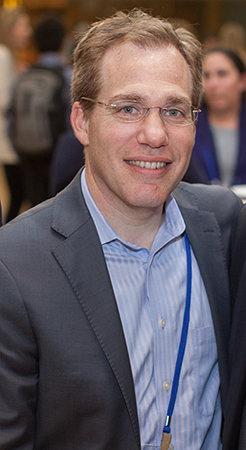Meet a FASI Leader: Wayne Shreffler
Wayne Shreffler is the director of the Food Allergy Center at Massachusetts General Hospital, the division chief of pediatric allergy and immunology at MassGeneral Hospital for Children, a principal investigator at the Center for Immunology and Inflammatory Diseases, an associate professor of pediatrics at Harvard Medical School, and a member of FASI’s scientific steering committee.
What does your lab study?
I’m a clinical scientist and I run interventional trials in allergy. In my lab, we’re interested in how the adaptive immune system (the part that specifically recognizes and remembers allergens) regulates antibody-mediated allergies and influences how people respond to therapies. To study this, we run clinical trials and examine the human immune response using single-cell technologies.
We know that there’s a lot of variation among patients with food allergy, and our focus is on trying to understand that heterogeneity. This will contribute to the more fundamental question of how this part of the immune system interacts with the more primitive part of the immune system to ‘sense’ the diet and ultimately help us understand why people develop allergies to begin with. The kinds of questions we’re trying to answer are things like: why do some people outgrow their allergies and others don’t? Why do some do well with particular therapies and others don’t? And why are some people more clinically sensitive? It’s a huge unmet need that I hear from patients all the time that we don’t have a test to distinguish how allergic someone is and what to expect as they grow.
Why are you excited to be part of FASI?
There’s so much that we wouldn’t be able to do on our own that this group can bring to bear, like the innovations in wet lab and of informatics in the labs of fellow scientific steering committee members Aviv Regev or Chris Love.
For me, as someone who puts a lot of effort into clinical science, I think you have an ethical obligation to get the most information you can out of every patient who volunteers their precious time and samples. And to take the opportunity to learn from trials even if they fail, that’s the kind of thing that can only happen if you’re part of a group that’s really doing good science with these samples.
This is why I came to Boston. The fact that we have a place like the Broad and all these investigators in proximity to major medical centers where we can run trials for people—it’s an amazingly rich environment.
 Wayne Shreffler
(Image credit Erik Jacobs)
Wayne Shreffler
(Image credit Erik Jacobs)
What is FASI support enabling you to find?
FASI support, including facilitating collaborations, has been really helpful in two ways. First, we’re collaborating with gastroenterologist (and FASI scientific steering committee member) Ramnik Xavier to look at the microbiome profiles from our cohort of infants with food allergy, and there are some potentially exciting findings emerging there. And secondly, our collaboration with Chris Love, which predates FASI, has really been invigorated through the addition of voices like Aviv’s on the informatics side.
What I’ve been really excited about is the identification of very specific small subsets of T cells that we think are probably most important in driving disease. I think that really has the potential to lead to new insight, new prognostic markers, new diagnostic markers, and hopefully help us better inform new therapy.
As a clinician, what are your thoughts on the apparently rising rates of food allergy?
Part of it hopefully will be blunted by our understanding that the advice to avoid potential allergens early in life has been wrong, and the reversal of those recommendations will hopefully help slow or reverse that increasing trend. But we’re still seeing an increase in all sorts of immune-related non-communicable diseases, which we hope we’ll understand from studies of the microbiome and other early factors. There’s certainly a lot to learn.